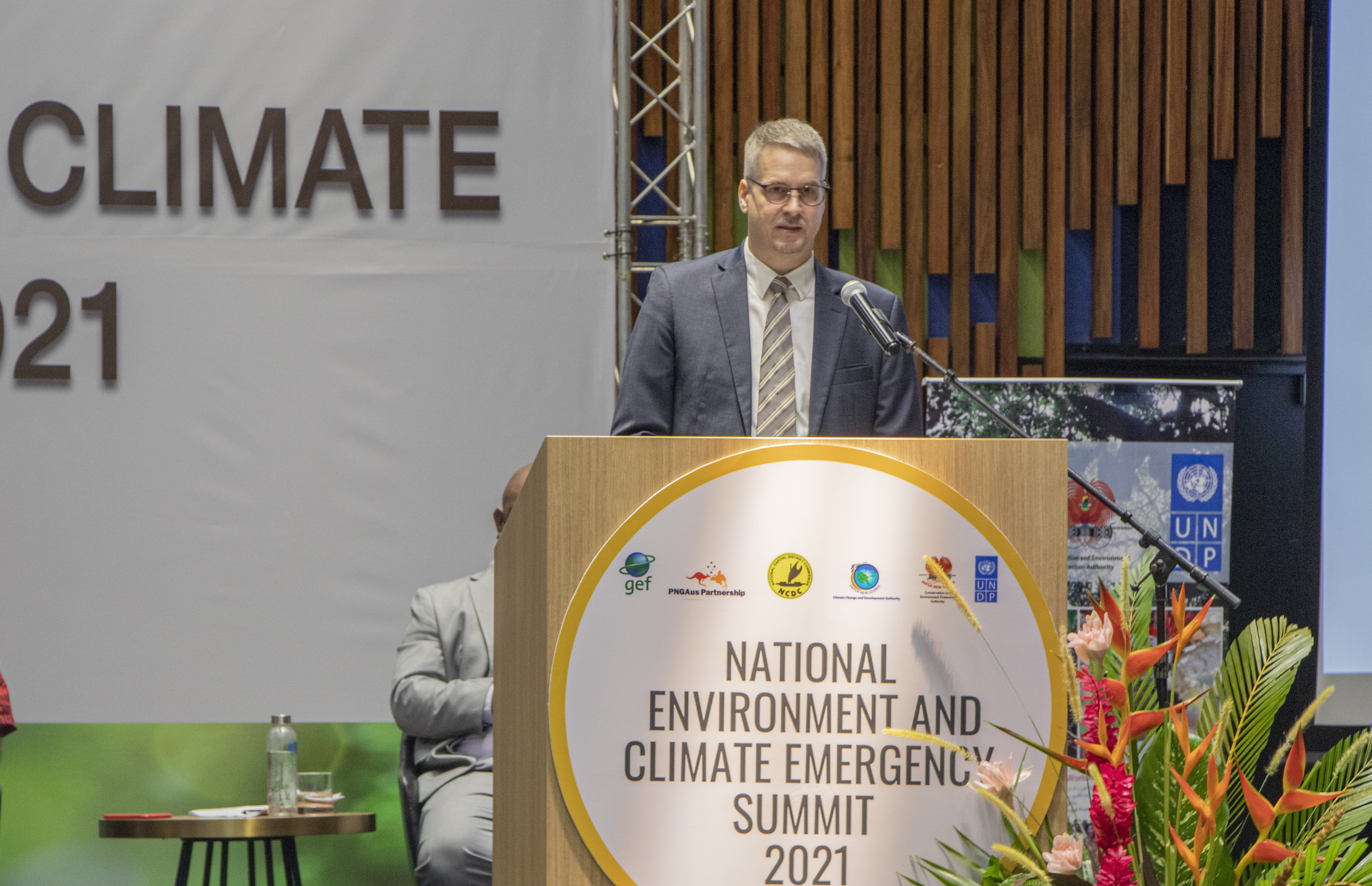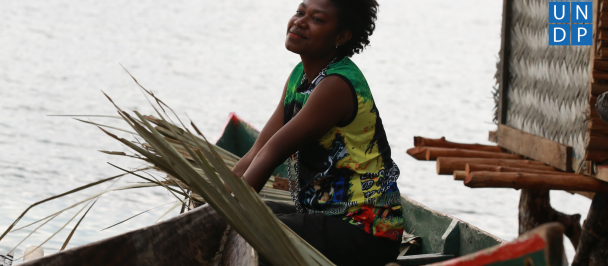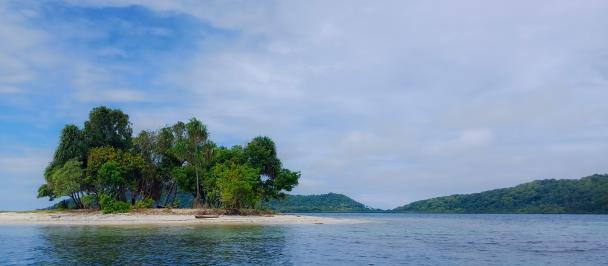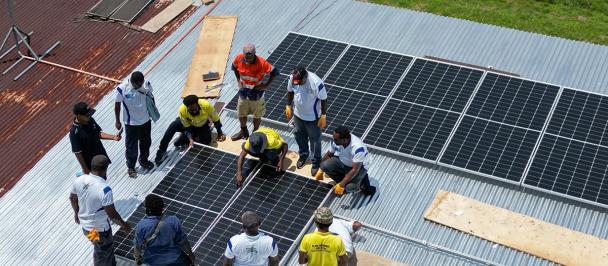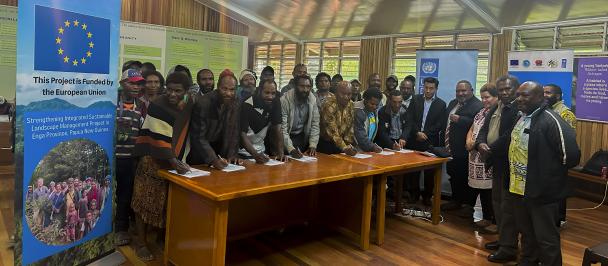Mr Wagener giving his speech at the opening of the Environment and Climate Emergency Summit 2021.
Remarks by Mr. Dirk Wagener, UNDP Resident Representative at the occasion of the WORLD ENVIRONMENT DAY 2021 Environment & Climate Emergency Summit
4 June 2021
Salutations:
- Hon. Wera Mori, Minister, Environment, Conservation and Climate Change
- Hon. Powes Parkop, NCD Governor
- Honorable Ministers and Governors, Members of Parliament
- Excellencies Ambassadors and High Commissions, members of the diplomatic corps, development partners
- Managing Directors of CEPA and CCDA
- Representatives of Government departments
- Representatives from non-governmental organisations, civil society organisations, the private sector, and community members.
- Most importantly, citizens of Papua New Guinea - viewing these proceedings remotely through the livestreaming.
Monin tru olgeta.
I am honored to be here at this landmark First National Environment and Climate Emergency Summit. It comes at a critical time to reverse the impacts of climate change - and a call to action to restore ecosystems and biodiversity globally.
Our climate emergency:
The simple, hard truth is that our planet is facing a climate and biodiversity emergency.
Biodiversity is declining globally at rates unprecedented in human history.
Over the last 50 years, global wildlife populations of mammals, birds, fish, amphibians, and reptiles have plunged by 70%. Let me repeat this again 70% of the global wildlife has been lost. We will soon be telling stories of wildlife our children will never have the chance to see.
For the first time in history, instead of the planet shaping humans, it is us - humans – who are shaping the planet. The pressures we are putting on the planet are so great that scientist argue we are in a new geological age – the Anthropocene – the age of humans.
Yes, we have made incredible progress. We have improved the health, education and livelihoods of billions, including the people of Papua New Guinea.
But our actions – particularly our dependence on fossil fuels and material consumption – are driving not just climate change and biodiversity collapse, but ocean acidification, air and water pollution and land degradation.
We are destabilizing the very systems upon which we rely on for survival at unprecedented speed and scale. We are playing with our very own future as the human species, and with it the future of our planet – Mother Earth.
The COVID-19 pandemic – which is likely to have sprang from wildlife – is the latest harrowing consequence of planetary imbalance. Scientists have long warned that diseases will emerge more often from interactions between people and wildlife, interactions that have steadily increased in scale and intensity, squeezing ecosystems so hard that deadly viruses spill out.
The Planetary and Climate Crisis and Emergency obliges us to take urgent action:
The Government of Papua New Guinea aims to halve the projected greenhouse gas emissions of the country by 2030 - and become carbon neutral by 2050. That is a great and laudable target and ambition.
However, projections suggest that the current GHG emissions will increase by up to 40% by 2030 - to 180 Mt CO2e. Communities are already experiencing the real impacts of climate change, from reduced agricultural production, reduced fish stocks, contaminated water supplies, by rising sea levels - and an increase in natural disasters such as hurricanes, drought, cyclones, flooding, and landslides.
The time to act is now, today! This Summit could be a momentous occasion when the country draws a line in the sand to decide on the type of planet we want to live in.
Importance of the Summit:
The Summit has the potential to highlight how new conservation and climate-compatible business opportunities can drive PNG’s long-term economic prosperity, while supporting livelihoods and protecting the environment at the same time.
It is not a choice – and let me emphasize this strongly – between trees and people, between planet or development. There is no such choice as both go hand in hand. Only if we protect the planet we live on, its rich resources and biodiversity, we will be able to continue to thrive as nature provides us with all life support systems and livelihoods. We cannot destroy them.
PNG can, with the correct investments, become a world leader in renewable energy, green commodities, and sustainable fisheries. Globally, countries are already positioning their development pathways away from resource depletion - towards green and blue economies that protect and conserve resources while economically and socially thriving at the same time.
I am greatly encouraged that so many decision-makers have joined today’s Summit. This clearly indicates the commitment in the room to realise a prosperous, sustainable, and equitable future for all Papua New Guineans.
Protected Area Forum:
I would like to commend Minister Mori - and the Conservation and Environment Protection Authority, on successfully hosting the country’s first Protected Areas Forum over the last two days.
I was humbled to witness the collaboration between PNG stakeholders, jointly solving problems and working in partnership. Finding common solutions to shared challenges, it is an outcome that this Summit can replicate.
World Environment Day:
Tomorrow, on 5 June - we celebrate World Environment Day.
It signals the start of the United Nations Decade on Ecosystem Restoration - a global mission to revive billions of hectares, from farmlands to forests, from the top of mountains to depths of the seas.
Ecosystem restoration means preventing, halting, and reversing damage to natural ecosystems – from exploiting nature to healing and restoring ecosystems, healing nature so we can continue to live.
Only with healthy ecosystems can we enhance people’s livelihoods, fight climate change, and stop the collapse of biodiversity that would lead to a collapse of humanity as we know it.
It comes at a critical time, where we acknowledge the consequence of inaction, listen to the voices of communities experiencing the impacts of climate change , of ecosystem destruction, and redouble our efforts to address the climate and ecosystems emergencies.
Global commitments:
UNDP supports the Government’s commitments towards the post-2020 biodiversity framework and National Determined Contributions, both to be presented at the forthcoming Congress of the Parties events later this year.
The next global Climate Summit, hosted by the United Kingdom, will be the most significant climate event since the 2015 Paris Agreement. Governments from around the world will be reporting on progress made since the Paris Agreement – and will take new decisions and actions on how to cut carbon emissions.
As the United Nations Decade on Biodiversity - from 2011 to 2020 - comes to an end, a new Post-2020 Global Biodiversity Framework will be discussed at the Global UN Biodiversity Summit, hosted by China. Governments are already supporting commitments to expand the proportion and land and oceans under protection to 30% by 2030.
UNDP’s long history of supporting PNG:
UNDP has proudly supported Papua New Guinea for the past four decades opening our office here in 1980. We will continue to do so to help achieve its sustainable development pathway.
UNDP has supported the policy to kick start a renewable energy transition in the country and to pilot community level renewable technologies.
UNDP is actively supporting PNG to address mitigation and adaptation targets. The roadmap to achieve its Sustainable Development Goal 13 on Climate Action, PNG’s Nationally Determined Contributions as well as National Climate Change Adaptation Plan are all examples of UNDP’s systematic support to climate action.
Further, UNDP has stood side by side with PNG’s journey to protect its unique biodiversity. UNDP has supported the Protected Area Policy as well as currently the finalization of the Protected Area Bill. It has and is currently supporting the gazettal of more than four million hectares of Protected Areas in PNG.
These aspirations all require systematic and coordinated financing and partnerships. UNDP is supporting the establishment of a national Biodiversity and Climate Fund to attract, manage and disburse funds from a range of financing options. This independent fund will have a true PNG identity, registered - and operated in PNG, with a multi-stakeholder Board of Directors, ensuring that it is an example to the world- which PNG can be proud of.
Support for action:
With that, I thank you once again Hon. Minister Mori, Gov. Parkop Ministers and Governors, Ambassadors, and valued partners - for your vision and commitment. UNDP looks forward to continuing the collaboration with all of you to take the global climate and biodiversity emergencies head-on.
Tenk yu tru.
[END]

 Locations
Locations